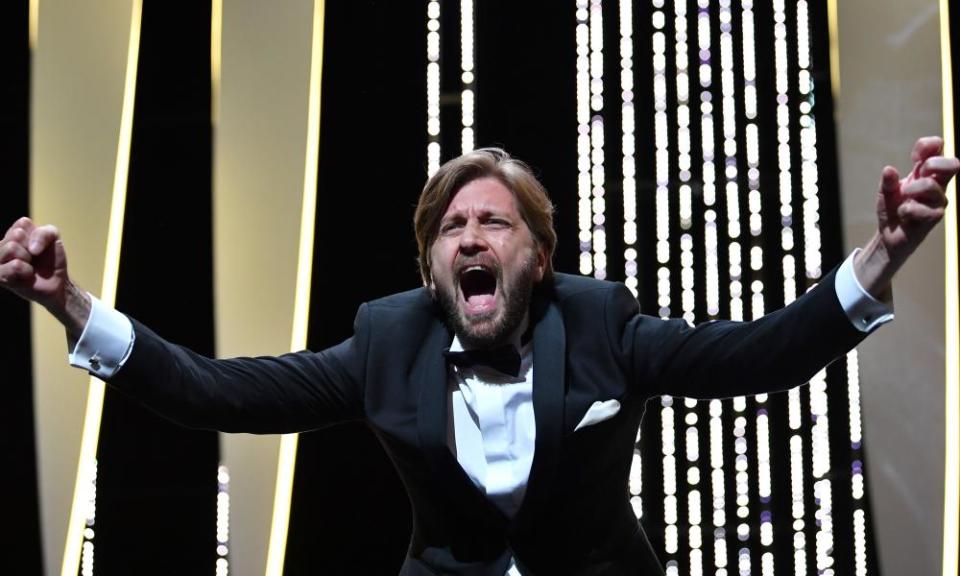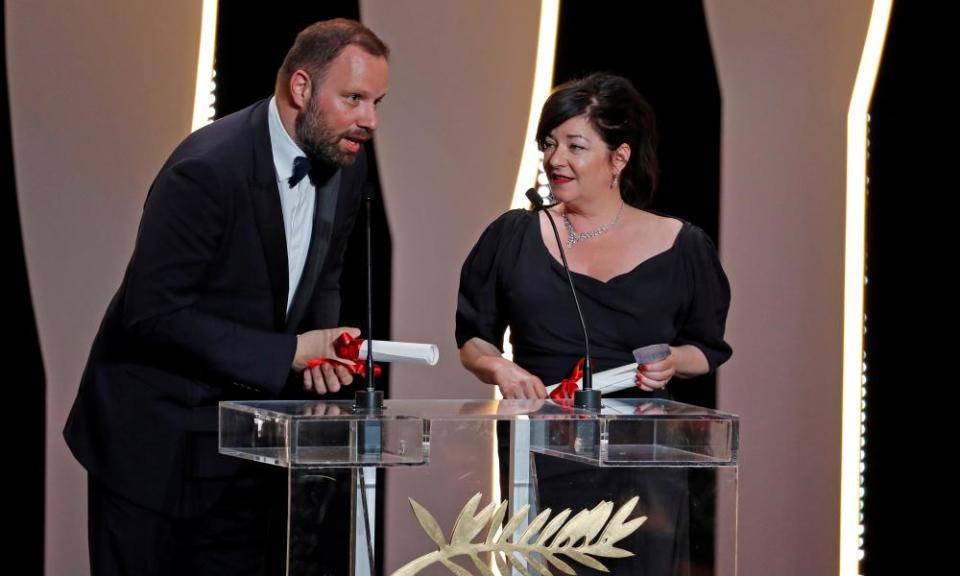Cannes 2017 awards: visceral power overlooked in favour of bourgeois absurdity | Peter Bradshaw

The results are in, and Pedro Almodóvar’s Cannes jury has delivered a prize list which is not as off the wall as it has been in the past. However, there is one à quoi pensaient-ils? moment. Diane Kruger was awarded best actress for a self-conscious and borderline-preposterous turn as a hand-wringing avenger in the disappointing and shallow TV-movie-style drama about neo-Nazi terrorism called In the Fade, from Fatih Akin. That really was a film to forget, with a very misjudged ending which appeared to think it had split the difference between choosing violence and non-violence.
However, the Palme d’Or has gone to Ruben Östlund’s The Square, which is a reasonable choice, although I didn’t think it was the best in competition. It is a long film about an ambitious art gallery director who suffers a kind of suppressed breakdown when his phone is stolen and subtly displaces his malaise out into the “community” of the gallery itself, with its curators, sponsors, artists and visitors. It is a stylishly made, visually striking film with something of Ballard, stuffed with disquieting mood-swings and brilliantly composed set-pieces, culminating in the bizarre and terrifying sequence when a performance artist pretending to be an ape is brought on to amuse an art gallery’s wealthy patrons at a fancy black-tie dinner and he goes … well … ape.
This character was superbly played by the American actor and movement-coach Terry Notary and I have a very lively suspicion that Mr Notary swung it for Östlund’s The Square. It is a real talking point in a film full of talking points, with black comic quirks and showstoppers that could appeal to a jury of many languages, backgrounds, sensibilities. Something for everyone. All jury decisions are compromises of course, and I suspect that The Square is the one film that they could all agree that they liked, and I further suspect it was a unanimous second choice with everyone disagreeing on the top dog. But it is a very good film, with a marvellous performance from an actor I had never noticed before: Claes Bang, as the preening museum chief. (He was in The Bridge.)
Robin Campillo’s outstanding film 120 Beats per Minute gets the Grand Prix; this is the one prediction I got right. It is one of the very best films at Cannes: a defiant, passionate, heartwrenching and in its way euphoric movie about the ACT UP movement in Paris in the late 80s and early 90s, campaigning aggressively for the complacent political establishment and bland careerists of Big Pharma to do something about Aids research. It is a film whose emotional force builds progressively through the film; appropriately, its heartbeat maintains a steady, accumulative intensity. The largely unknown cast were all superb. It’s a film I can’t wait to see again when it is released in the UK.

On now to my personal disappointment – although of course I am delighted that it came away with something. Andrei Zvyagintsev’s Loveless is the film I was tipping for the Palme, a film with the clarity and consistency of a diamond. As things turned out, it got the jury prize, an award which is sort of like the bronze to the Grand Prix’s silver. This film is a kind of desolate spiritual crime-procedural about a divorcing Russian couple who have to work together when their 12-year-old son goes missing. It is a trauma whose aspects and implications are opened up in a masterly composition of scenes and Zvyagintsev brilliantly shines a light on what he sees as the condition of modern Russia, with its materialism and aspirational heartlessness – and indeed lovelessness. It is an outstanding film in the “domestic” vein of his 2011 drama Elena, without the obvious Dostoyevskian grandeur of his previous film Leviathan. But still magnificently powerful. And talking of Dostoyevsky, I was disappointed to see that no prizes were given to Sergei Loznitsa’s A Gentle Creature (loosely inspired by a Dostoyevsky short story), perhaps because there is an unacknowledged convention that there can be no more than one harrowing Russian film on the prize list.
Lynne Ramsay’s You Were Never Really Here is a stunning crime drama that the director has hyper-evolved into a nightmarish portrait of someone’s private emotional agony. Many were hoping that Ramsay would get the Palme and so become only the second woman director to do so. As it was, her film got best actor for Joaquin Phoenix, and shared the screenplay prize with Yorgos Lanthimos and Efthymis Filippou for their The Killing of a Sacred Deer. Phoenix puts his heart on his sleeve and displays an extravagantly wrecked physique and raddled, bearded face to the world, playing an ex-soldier now employed by a private security firm to do dirty, deniable work for wealthy people. He is employed by an ambitious politician to rescue his teenage daughter from a trafficking ring, and things go terribly wrong. It is a very striking performance from Phoenix, although I can’t help thinking that in terms of pure acting technique there were other, bolder contenders.
Robert Pattinson gave what I have to admit is a very charismatic performance in a film I was agnostic about: the Safdie brothers’ bank-robbery picture Good Time. And Ben Stiller was genuinely excellent in Noah Baumbach’s comedy The Meyerowitz Stories, which itself had a shot at best screenplay. Ramsay’s film is well written, and everyone at film school gets told that screenplay is not about writing lines of Algonquin dialogue, but constructing and melding the form of a movie. The mood arc created by Ramsay is outstanding. The Killing of a Sacred Deer is a film which also had its swirling mood music: an intriguing, unnerving film which I very much liked, although in pure screenplay terms, its ending was a little strained.
Sofia Coppola gets the director’s prize for The Beguiled: a prize which I had tipped for the great Michael Haneke; he had presented a film which had me gripped from the outset, but which most other critics had dismissed as a greatest-hits parody of all his favourite themes. Coppola is an outstanding director whose Marie Antoinette I remember being a great event at Cannes back in 2006 and whose The Bling Ring in 2013 rather brilliantly intuited the modern infatuation with social-media celebrity. The Beguiled is a revival of a steamy, gamey emotional drama set during the American civil war which Don Siegel filmed in considerably more explicit terms back in 1971. Coppola’s re-evaluation of the material makes it less outrageous, although to call it subtler isn’t exactly right. It has some very melodramatic moments and great comic flourishes and it is a highly enjoyable, watchable Hollywood picture – the single mainstream Hollywood picture in competition, in fact – and all its successes are the result of a sure directorial hand. Coppola is a very distinctive director who is occasionally subject to condescension; she was not my choice for this prize, and I think Ramsay came out ahead. But she delivered a very pleasurable film.
So this started out as a Cannes which was all about the refugee crisis, and sadly none of the films honoured really reflected that: the festival bestowed its highest honour on an elegant dissection of haute bourgeois absurdity and vanity, and overlooked the more visceral power of Zvyagintsev, Ramsay and indeed Loznitsa. But this is a good list, a launching pad for a clutch of excellent films.

 Yahoo Movies
Yahoo Movies 